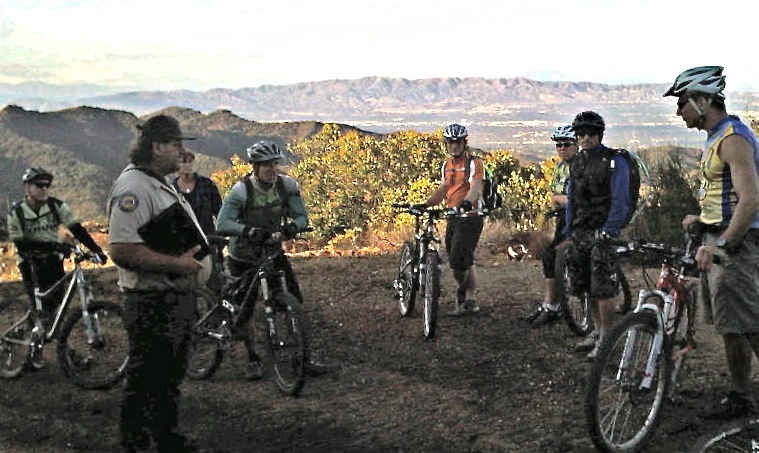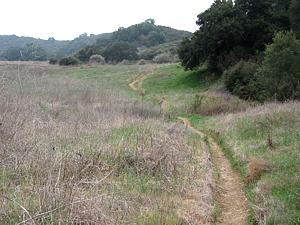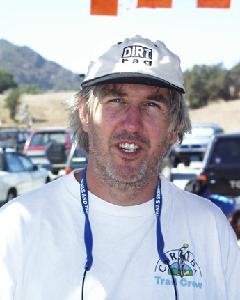On November 10, CORBA Board members Mark Langton, Jeff Klinger, Hans Keifer, Danusia Bennet-Taber, and Steve Messer, along with Jim Hasenauer of IMBA and Bryan Gordon of the Canyonback Alliance, walked/rode the upper section of Rogers Road Trail with Topanga Sector Superintendent Lynette Brody and Maintenance Supervisor Dale Skinner. This tour was arranged by CORBA with these State Park employees in response to intense public input regarding recent work performed on the “re-route” (singletrack) section of trail (west where it meets Temescal Ridge Fire Road) as well as about a mile and a half of the wider road bed to the east of the singletrack. In the past few weeks, Supervisor Skinner has used a Sweco trail tractor/dozer to fix and install several drainage channels, as well as bring the trail up to vegetation clearance guidelines for multiple use, specifically, equestrians. Many local trail users have complained to State Parks that the work was overdone and that a once narrow, serene singletrack trail has been obliterated into a road.
There are actually two separate sections, the “re-route” which was built as a true narrow trail, and the main Rogers Road Trail, which was originally a road cut that supported wide and heavy equipment.
Earlier comments on CORBA’s web site began by trying to assuage concerns of trail users not familiar with this kind of work by saying that typically trails “come back” to a more natural state after a couple of seasons. This can be said for the “re-route” section, although CORBA noted to Supervisor Skinner that the widening created a “faster trail” and suggested that possible speed control devices such as pinch-point structures be considered.
As for the wider section, based on the tour that took place on November 10, CORBA’s original comments were premature. After witnessing the complete section of the work area and hearing comments made by Supervisor Skinner, as well as an evaluation by professional trail contractor Hans Keifer, it is evident that the work that was performed lacked forethought and consideration for minimal impact. In fact, no Project Evaluation Form (PEF) was submitted for this work and therefore is in direct violation of the department’s own policy. We were assured by both Superintendent Brody and Supervisor Skinner that the work will not continue until a Project Evaluation Form is completed and that trail users will have a say in the process, which they said could take several months to over a year.
It’s true that after new construction or trail maintenance, trails look bare and lose their natural character. Typically, Spring rains create new vegetation which helps the trails recover some of their more natural character. This has been our experience on several agency trail maintenance projects in the past. In the case of the recent work on the wider section of Rogers Road Trail there was a fundamental disagreement between the State’s position that Rogers should be maintained to “road” standards and that vegetation should be cut wider than the 8-foot wide/10-foot high vegetation clearance suggested by multiple use guidelines–and CORBA’s position that Rogers is a trail (the Backbone Trail), not a road; that the 8-foot/10-foot clearance was for new trail construction, not existing trails, and that the trail should be left as narrow and natural as possible while addressing and achieving the maintenance concerns of water drainage and a proper vegetation width for shared use with equestrians.
We acknowledged that this is a multi-use trail that must work for all users and that there are several drainage and maintenance issues that are beyond the scope of handwork. We demonstrated how anything more than an 8-foot clearance wasn’t necessary for safety or sustainability and that in many cases the clearance that has been done was far wider than eight feet. CORBA’s position is that this work went too far and urged State Parks to minimize the impact of the maintenance on the only bike-legal singletrack in Topanga State Park.
We were informed that the plan was to continue the work down to the Will Rogers State Historic Park Trail Loop, and we also expressed serious concern about continuing these impacts into what is admittedly an eroded and deteriorating section of trail. Superintendent Brody and Supervisor Skinner reiterated that moving forward, greater evaluation and a full PEF would take place and could take several months to over a year.
Examination of the new/refurbished drains that were installed shows minimal attention to corrected out sloping to facilitate proper drainage; drains were basically cut with only a few passes with the Sweco’s blade and very little additional shaping or contouring was evident. On another section of trail, an entire corner (approximately 250-300 square feet) was scraped clean of vegetation, with the reason for the denudation being “ it’s for the hikers. Hikers like the beautiful views.” This brush clearance ignores the fact that it created a large, bare, disturbed area of unprotected, easily eroded earth that will exacerbate hydro erosion because there is no root system to control runoff. Also, there was no drain installed at the bottom of the hill where water would run to from this bare area. Another section of trail further south was smoothed of ruts and out sloped correctly. However, the width of the tread was increased to approximately 12 feet, far more than what CORBA considers appropriate or necessary.

Maintenance Supervisor Dale Skinner (left foreground) and members of CORBA discuss the complete removal of vegetation from dozens of square yards of soil at an "overlook" section of Rogers Road Trail. Photo by Jim Hasenauer
Again, we were assured by both Superintendent Brody and Supervisor Skinner that the work will not continue until a Project Evaluation Form is completed and that trail users will have a say in the process. Check back here for further information as we get it. There will be several opportunities to get involved as trail planning in Topanga State Park and the rest of the Santa Monica’s moves forward. We encourage you to get involved with your parks’ planning process and be proactive in shaping park policy, planning and landscapes.







State Parks Programatic EIR Public Hearing
Wednesday, November 10th, 2010This Saturday, November 13, California State Parks will be hosting the final public hearing on their Draft Programatic EIR.
Bicycle access to trails in the Santa Monica Mountains and many other areas will be directly affected by the final version of this document, so it is important to ensure that mountain bikers are fully engaged in this process. CORBA and IMBA representatives will be attending, and we urge everyone who would like to see more trails opened for bicycles in State Parks to attend and make comments.
What is a Programatic EIR? This is an effort to streamline the process of converting trails from one designation, such as hiker-only, to another designation, such as multi-use. This is good for mountain biking. According to IMBA:
California State Park’s Director Ruth Coleman has embraced a statewide Programatic Environmental Impact Report (PEIR) that will improve the process to convert trails to shared-use status. “This will lay the groundwork for the efficient conversion of trails that IMBA California and clubs have been requesting for some time,” says IMBA California’s Tom Ward. This bodes well for efforts to open Bill’s Trail in Marin, as well as numerous trails in Santa Cruz and Humboldt counties, Mt Diablo State Park, Folsom State Recreation Area, Donor Lake State Park, various Sonoma County parks and miles of trails in the Los Angeles basin. According to Ward, park managers have often shown support for improved mountain bike access — but each time they attempt implementation they are threatened with lawsuits from opposing forces. “The intent of PEIR is to curtail the legal challenges to each trail conversion project,” says Ward. He adds, “This is a major milestone for IMBA’s efforts to increase mountain bike access in state parks.”
The meeting will take place from:
1:00 to 4:00 p.m. Saturday, November 13
Lake Activities Building,Lake Perris State Recreation Area,
17801 Lake Perris Drive,
Perris, CA 92571 [map].
The Notice of Preparation for the draft PEIR can be found at http://www.parks.ca.gov/?page_id=980. Public comments are being accepted through November 30. Comments on the PEIR may be submitted in person at the workshops, or by either mail to:
Environmental Coordinator – Trails PEIR
1 Capitol Mall, Suite 410
Sacramento, CA 95814
Or by email to: ceqansc@parks.ca.gov
(Note: In the Subject Line, write: ‘Trails PEIR’)
Comments can also be submitted by Fax to: (916) 445-8883; Please address faxes to: Environmental Coordinator – Trails PEIR
We’ll have more details and a more thorough report after Saturday’s presentation and hearing.
Tags:Advocacy, Public Comments, public hearings, Santa Monica Mountains, State Parks, Topanga
Posted in Advocacy, California, Santa Monica Mountains, Trail Access | Comments Closed